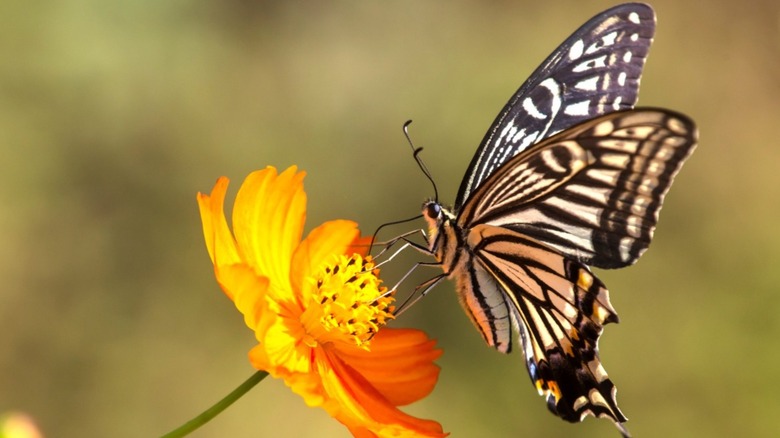The Benefits Of Planting Cosmos In Your Edible Garden
Cosmos flowers are as cute and happy as their name suggests, coming in multiple shades of red, purple, white, and pink. But as it turns out, these little lovelies also make the perfect companion plant in your vegetable garden! Especially if you're growing organically, cosmos flowers help attract necessary pollinators and deter detrimental pests at the same time. Speaking of nasty pests to contend with, one of the only ones attracted to cosmos are aphids, which makes them something of an effective "trap-crop" plant, as well.
Cosmos are known for being simple to grow in a variety of adverse conditions, whether it be dry and hot or rainy and wet. Even if the soil is low in nutrients, cosmos can thrive nearly anywhere and tolerate full sun. However, it's important to know that if you're purchasing cosmos as a companion plant, be sure to get one grown from organic and open-pollinated seeds, not hybrid as they tend to be sterile. Additionally, growing them organically means being able to brighten up salads and eat the cosmos flowers, if you like!
Cosmos attracts necessary pollinators
One of the biggest benefits cosmos provides is its ability to attract pollinators which are necessary for any good vegetable garden. For example, bees, butterflies, and ladybugs love them. In fact, monarch chrysalises have been known to grow on the cosmos plant. This means butterflies can feed off the pollen and lay their eggs on the plant. Other beneficial insects attracted by cosmos are lacewings, tachinid flies, hoverflies, and parasitic wasps. These insects feed on multiple detrimental pests like aphids, thrips, and scale, and are also efficient pollinators.
Cosmos makes a terrific companion plant for tomatoes, corn, pumpkin, and squash in particular. When you plant these kinds of edibles in your garden, the more pollinators that come to visit, the higher the yield of the fruits. This also goes for cucumbers, zucchinis, strawberries, and even beets too; all benefit from having cosmos planted next to them. Planting these colorful flowers among your veggies helps to ensure you get the healthiest and most productive possible. Not only that, but it adds another layer of aesthetic appeal to an edible garden.
Cosmos deters detrimental pests by attracting predators
When you decide to stop using chemicals and pesticides, learning the technique of companion planting will be one of the keys to success. Cosmos are known to deter certain pests that can be particularly devastating to edibles. One example of this type of pest is the tomato hornworm. This is a caterpillar that can severely defoliate and ruin a tomato crop. However, its natural enemies are the green lacewings and parasitic wasps that cosmos flowers attract.
Another particularly devastating pest in an edible garden is the corn earworm. Cosmos are known for repelling this pest because they attract its predators. The corn earworm can cause serious damage to corn, but it also feeds on tomatoes, peppers, and other vegetables. When in the larval stage, they bore into the fruits of tomatoes and other plants. By attracting the predator insects of these garden pests, cosmos can help to deter them from entering in the first place.



